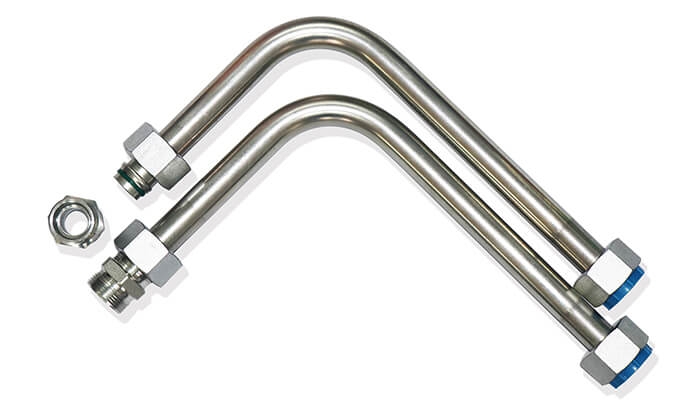Mechanical Properties for Engineering and Technical: Hydraulic Steel Tube
-
 2023-07-11
2023-07-11
-

Hydraulic steel tubes are a fundamental component in various industries, offering exceptional strength, durability, and versatility. Whether it’s for heavy machinery, automotive systems, or even structural applications, hydraulic steel tubes play a crucial role. This blog post will delve into the mechanical properties of cold drawn seamless (CDS) tubes, their applications across different industries, stress analysis considerations, and optimization techniques. As we embark on this exploration, let’s first introduce the leading manufacturer in this field: Xuzhou Global Precision Steel Tube Co., Ltd.
It is impossible to overstate the critical role hydraulic systems play in fueling a wide variety of industrial operations. All these operations rely on an essential part – hydraulic steel tubes. In this article, we will consider what makes these tubes indispensable in engineering and investigate their manufacturing process in more detail. Get ready to find out key information about hydraulic steel tubes, unlocking the secret of how they facilitate the smooth and effective transfer of hydraulic fluid and pressure!
I. Mechanical Properties of Hydraulic Steel Tubes:
Hydraulic steel tubes, particularly those made using the cold drawn seamless (CDS) process, exhibit superior mechanical properties. The CDS technique involves drawing a hot-rolled steel tube through a die to achieve the desired shape and size. This process results in improved tensile strength, excellent dimensional accuracy, and enhanced surface finish. The combination of these properties makes hydraulic steel tubes ideal for applications involving high pressure, bending, and torsional loads.
II. Applications in Different Industries:
1. Heavy Machinery and Equipment:
Hydraulic steel tubes find extensive use in heavy machinery and equipment, including hydraulic cylinders, excavators, cranes, and loaders. These tubes transmit hydraulic fluid efficiently, enabling the seamless operation of various mechanical systems. Their robust construction and resistance to corrosion make them indispensable for enduring harsh operating conditions.
2. Automotive Industry:
In the automotive industry, hydraulic steel tubes play a vital role in brake systems, power steering, and transmission systems. The precise dimensions, exceptional strength, and resistance to vibration and fatigue ensure reliable and safe performance. Additionally, their ability to withstand high pressures and temperature variations makes them ideal for hydraulic applications.

III. Stress Analysis and Optimization Techniques:
1. Stress Analysis:
Ensuring the structural integrity of hydraulic steel tubes is crucial for their reliable performance. Stress analysis techniques, such as finite element analysis (FEA), enable engineers to assess the behavior of tubes under different loading conditions. By simulating stress distributions, deformation, and failure modes, FEA helps identify potential weak points and optimize tube design.
2. Optimization Techniques:
To maximize the performance of hydraulic steel tubes, optimization techniques can be employed. These techniques involve optimizing factors such as tube geometry, material selection, and heat treatment processes to enhance strength, reduce weight, and minimize costs. Advanced optimization algorithms, coupled with computer-aided design (CAD) software, allow engineers to find the optimal balance between performance and efficiency.
Ⅳ. Manufacturer Spotlight: Xuzhou Global Precision Steel Tube Co., Ltd
Before diving into the technical details, it’s worth highlighting the manufacturer behind these superior hydraulic steel tubes. Xuzhou Global Precision Steel Tube Co., Ltd, renowned for its commitment to precision and quality, stands at the forefront of hydraulic steel tube production. With a reputation for excellence in manufacturing, they have become a trusted partner for industries that rely on hydraulic systems. Now, let’s explore the essential attributes and advantages of hydraulic steel tubes.
1. Robust Construction for Optimal Performance:
Hydraulic steel tubes are crafted from high-quality steel and carefully selected for their durability and strength. They undergo a meticulous manufacturing process, including precision cold drawing, heat treatment, and other advanced techniques. This attention to detail ensures the tubes can withstand the high pressures and extreme conditions commonly encountered in hydraulic systems. The robust construction of hydraulic steel tubes allows them to operate reliably, even in demanding applications.
2. Seamless Precision for Enhanced Efficiency:
One of the defining characteristics of hydraulic steel tubes is their seamless construction. This means they are devoid of any welded joints or seams, resulting in a smoother internal surface. The absence of irregularities and imperfections allows the hydraulic fluid to flow freely, reducing frictional losses and pressure drop within the system. This seamless precision translates into enhanced efficiency, ensuring optimal performance and minimizing energy wastage.
3. Dimensional Accuracy for Versatility:
Hydraulic steel tubes are manufactured with exceptional dimensional accuracy, meeting stringent tolerances and specifications. This precision allows for seamless integration into hydraulic systems, ensuring a tight fit and minimizing leakage risks. The dimensional accuracy of hydraulic steel tubes also enables compatibility with various connectors, fittings, and valves, facilitating easy installation and maintenance.
4. Corrosion Resistance for Longevity:
In hydraulic applications, exposure to moisture and other corrosive elements can be a significant concern. Hydraulic steel tubes combat this issue with their inherent corrosion resistance. Whether subjected to harsh environments or prolonged contact with hydraulic fluids, these tubes exhibit remarkable resistance to corrosion, prolonging their lifespan and ensuring reliable performance over time.
5. Wide Range of Sizes and Configurations:
Hydraulic steel tubes are available in a wide range of sizes, diameters, and wall thicknesses to accommodate diverse hydraulic system requirements. This versatility enables engineers and manufacturers to select the most suitable tube dimensions for their specific applications, ensuring optimal performance and efficiency. Furthermore, hydraulic steel tubes can be customized with various surface finishes, such as zinc plating or phosphate coating, to provide additional protection and tailored functionality.
Conclusion:
Hydraulic steel tubes, such as those manufactured by Xuzhou Global Precision Steel Tube Co., Ltd, serve as the backbone of hydraulic systems, enabling the efficient transmission of power and fluid. With their robust construction, seamless precision, dimensional accuracy, corrosion resistance, and versatility, these tubes elevate the performance, reliability, and longevity of hydraulic systems in diverse industries. By investing in high-quality hydraulic steel tubes, engineers and manufacturers can ensure the smooth operation of their hydraulic applications while achieving optimal efficiency and cost-effectiveness.



